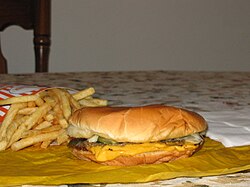Beef
Appearance
Beef is the culinary name for meat from cattle (Bos taurus). Beef can be prepared in various ways; cuts are often used for steak, which can be cooked to varying degrees of doneness, while trimmings are often ground or minced, as found in most hamburgers. Beef contains protein, iron, and vitamin B12. Along with other kinds of red meat, high consumption is associated with an increased risk of colorectal cancer and coronary heart disease, especially when processed. Beef has a high environmental impact, being a primary driver of deforestation with the highest greenhouse gas emissions of any agricultural product.

Quotes
[edit]- When mighty roast beef was the Englishman's food
It ennobled our hearts and enriched our blood—
Our soldiers were brave and our courtiers were good.
Oh! the roast beef of England,
And Old England's roast beef.- Henry Fielding, "The Roast Beef of Old England", in Grub Street Opera, Act III, scene 2. Claimed for R. Leveridge.
- A tale without love is like beef without mustard: insipid.
- Anatole France, La Révolte des Anges (The Revolt of the Angels), ch. 8 (1914).
- Who lives longer? the man who takes heroin for two years and dies, or a man who lives on roast beef, water and potatoes 'till 95? One passes his 24 months in eternity. All the years of the beefeater are lived only in time.
- Aldous Huxley in Kevin A. Fabiano, ed., The Shortcut: 20 Stories To Get You From Here To There (2006), p. 179.
- I am a great eater of beef, and I believe that does harm to my wit.
- William Shakespeare, Twelfth Night (c. 1601-02), Act. I, scene i, line 92.
- Where's the beef?
- Wendy's advertising campaign (from January 9, 1984). Later used by Walter Mondale in a Democratic presidential primary debate against Gary Hart.
- About this time, I heard of a well known Hindu having been converted to Christianity. It was the talk of the town that, when he was baptized, he had to eat beef and drink liquor, that he also had to change his clothes, and that thenceforth he began to go about in European costume including a hat. These things got on my nerves. Surely, thought I, a religion that compelled one to eat beef, drink liquor, and change one's own clothes did not deserve the name. I also heard that the new convert had already begun abusing the religion of his ancestors, their customs and their country. All these things created in me a dislike for Christianity.
- Mahatma Gandhi, The Story of My Experiments with Truth. Part I, Chapter 10, Glimpses of Religion
- Meanwhile, another Tabligh movement had arisen in Haryana under the leadership of Shah Muhammad Ramzan (1769-1825). “He found that the converted Rajputs and Jats… were in no way different from their Hindu counterparts in culture, customs and celebration of religious festivals… Shah Muhammad Ramzan used to sojourn in areas inhabited by such converted Rajputs, dissuade them from practising Hindu rites, and persuade them to marry their cousins (real uncle’s daughters which converts persistently refused to do). They equally detested eating cow’s flesh. To induce them to eat beef, he introduced new festivals like Maryam ka Roza and ‘Rot-bot’. On this day, observed on 17 Rajjab, a ‘pao’ of roasted beef placed on a fried bread was distributed amongst relatives and near and dear ones… Such endeavours ruled out the possibility of reconversion and helped in the ‘Islamization’ of neo-Muslims…”
- Muhammad Ramzan cited in K.S. Lal, The Legacy of Muslim Rule in India, quoted from (1997). Time for stock taking, whither Sangh Parivar?. Edited by S.R. Goel.
- When Araki accomplished the mission of converting people and training and guiding them in the new faith, he addressed the task of converting and guiding the womenfolk. Pious, puritanical, honest and trustworthy dervishes and sufis were selected and the task assigned to them. They were sent to all villages, localities and towns. In fact they reached each and every house. When they came to a homestead, they would get hold of the cow belonging to the housekeeper, kill it and sit down to eat beef in the company of womenfolk and family members. Along with this they administered the recitation of kelima to the womenfolk of the household, and taught them the basics of religion, the pillars of faith and the teachings of Islam. Distinguished vicegerents and sincere dervishes would enter the houses of aristocrats and the elite in order to administer kelima to them and make them eat beef. They would honour them by accepting their expression of repentance and make them promise that they would regularly offer prayers (namaz), observe fasts and other obligations. They also undertook to abstain from what was not permitted (in Islam). These special vicegerents and dervishes spread out in the suburbs of the towns and cities such as Pampur, Kani Pore (?) Shihabuíd-Din Pora etc. Men and women in these areas were apprised of what was permissible and what was not permissible in Islam.
- Muḥammad, A. K., & Pandit, K. N. (2009). A Muslim missionary in mediaeval Kashmir: Being the English translation of Tohfatu'l-ahbab. New Delhi: Voice of India. page 241
- Many years ago I found out something about hamburgers that really grossed me out. You may not know this, so I hope I don't make you sick, but it turns out hamburgers are actually made out of dead cows. I am not making this up. Needless to say, as soon as I discovered that, I gave up meat entirely.

